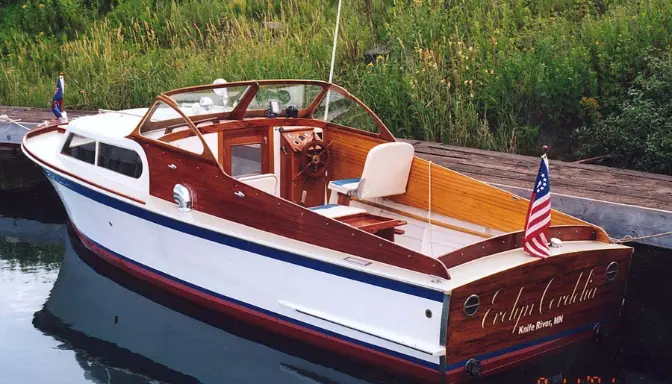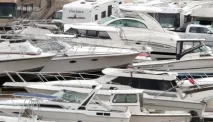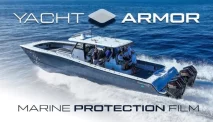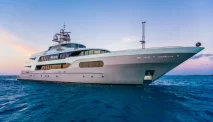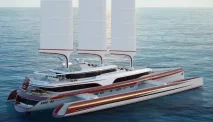Diksia.com - If you are looking for a fun and affordable way to enjoy the water, buying a small boat might be the perfect option for you. Small boats are versatile, easy to maintain, and can fit in most budgets. However, finding the best small boats for sale can be challenging, especially if you are not familiar with the different types, features, and options available.
In this article, we will guide you through the process of choosing and buying a small boat that suits your needs and preferences. We will also share some tips on how to finance and insure your boat, as well as how to keep it in good condition.
What are the benefits of owning a small boat?
Small boats are boats that are typically less than 26 feet in length. They can be powered by oars, sails, or engines, and can be used for various purposes, such as fishing, cruising, water sports, exploring, or simply relaxing.
Some of the benefits of owning a small boat are:
- They are cheaper to buy and operate than larger boats. You can find small boats for sale for as low as $1,000, depending on the type, condition, and age of the boat. You will also save on fuel, maintenance, storage, and registration fees, as small boats consume less gas, require less upkeep, and take up less space.
- They are easier to handle and transport than larger boats. Small boats are more maneuverable and responsive, making them ideal for beginners and experienced boaters alike. You can also tow them with most vehicles, and launch them from most ramps or docks, giving you more flexibility and convenience.
- They are more environmentally friendly than larger boats. Small boats produce less emissions, noise, and wake, reducing their impact on the water and the wildlife. They also allow you to access shallow and narrow areas that larger boats cannot reach, letting you explore more of the natural beauty and diversity of the water.
What are the different types of small boats?
There are many types of small boats, each with its own advantages and disadvantages. Here are some of the most common ones:
Jon boats
These are flat-bottomed boats that are usually made of aluminum or other durable materials. They are stable, simple, and versatile, and are often used for fishing, hunting, or utility purposes. They can be propelled by oars, small outboard motors, or electric motors, and are designed for use in calm waters where a deep draft is not required. Jon boats typically have a small, open deck and a simple design, with basic features like bench seating, a transom, and a small console. Jon boats are among the cheapest and most popular small boats for sale, with prices ranging from $500 to $5,000.
Skiffs
These are small, open boats that are usually powered by an outboard motor. They are typically used for recreational boating, fishing, and other water activities. They have a V-shaped hull that allows them to cut through waves and choppy waters, making them more suitable for coastal and offshore use than jon boats. Skiffs usually have a center console, a steering wheel, and a windshield, as well as some storage and seating space. Skiffs are more expensive and faster than jon boats, with prices ranging from $5,000 to $20,000.
Dinghies
These are small, lightweight boats that are often used as tenders to transport people and gear to and from larger boats. They can also be used for recreational purposes, such as sailing, rowing, or cruising. Dinghies can be inflatable or rigid, and can be powered by oars, sails, or small motors. Inflatable dinghies are convenient for portability and storage, but lack the structural integrity and durability of rigid dinghies. Rigid dinghies are more stable and sturdy, but require more space and maintenance. Dinghies are relatively affordable and versatile, with prices ranging from $500 to $10,000.
Inflatable boats
These are boats that are made of flexible materials, such as PVC or rubber, that can be inflated and deflated. They are ideal for portability and storage, as they can be folded and carried in a bag or a car trunk. They are also easy to set up and launch, as they only require a pump and a suitable surface. Inflatable boats can be used for recreational use, fishing, and as tenders. They can be powered by oars, sails, or small motors. Inflatable boats are usually cheaper and lighter than rigid boats, but also less durable and stable. They are prone to punctures, leaks, and UV damage, and require regular inspection and repair. Inflatable boats can cost from $500 to $5,000.
Aluminum fishing boats
These are boats that are made from aluminum or other lightweight metals. They are similar to skiffs, but are more specialized for fishing. They have a V-shaped hull that can handle rough waters, and a flat deck that provides ample space for fishing gear and accessories. They usually have a center console, a steering wheel, a windshield, and a livewell. They can also have rod holders, fish finders, trolling motors, and other fishing features. Aluminum fishing boats are durable, easy to maintain, and resistant to corrosion and rust. They are also more fuel-efficient and environmentally friendly than fiberglass boats. Aluminum fishing boats can cost from $10,000 to $50,000.
Pontoon boats
These are boats that have a flat deck supported by two or more pontoons. They are also known as party boats, as they are designed for socializing and relaxing. They have a spacious and comfortable layout, with plenty of seating, tables, and loungers. They can also have features like a canopy, a stereo system, a bar, and a grill. Pontoon boats are ideal for cruising, entertaining, and water sports. They are stable, easy to operate, and can accommodate large groups of people. However, they are also slow, bulky, and not very maneuverable. They are also more expensive and harder to store than other small boats. Pontoon boats can cost from $10,000 to $100,000.
Car-Topper boats
These are small, lightweight boats that are designed to be transported on top of a car. They are typically made from lightweight materials like aluminum or plastic, and are small enough to fit on the roof of most cars. They are also easy to set up and launch, as they only require a pair of roof racks and a suitable ramp or dock. Car-Topper boats can be used for recreational boating, fishing, and exploring. They can be powered by oars, sails, or small motors. Car-Topper boats are convenient and affordable, but also limited in size, speed, and features. They are also less stable and durable than larger boats. Car-Topper boats can cost from $1,000 to $5,000.
Canoes and kayaks
These are small, narrow boats that are usually propelled by paddles. They are versatile and can be used for recreational boating, fishing, and transportation on calm waters. They can also be used for adventure and sport, such as whitewater rafting, sea kayaking, and canoe racing. Canoes and kayaks are made from various materials, such as wood, fiberglass, plastic, or composite. They have different shapes and sizes, depending on their intended use and style. Canoes and kayaks are cheap, easy to transport and store, and environmentally friendly. However, they are also physically demanding, require skill and experience, and offer little protection from the elements. Canoes and kayaks can cost from $500 to $5,000.
How to choose the best small boat for you?
Choosing the best small boat for you depends on several factors, such as your budget, your boating experience, your intended use, and your personal preference.
Here are some questions to ask yourself before buying a small boat:
How much can you afford to spend?
Your budget will determine the type, size, and quality of the boat you can buy. You will also need to consider the additional costs of owning a boat, such as fuel, maintenance, storage, registration, and insurance. You can find small boats for sale for as low as $500, but you may also need to spend more to get the features and performance you want.
How experienced are you as a boater?
Your boating skills and knowledge will affect the type and size of the boat you can handle. If you are a beginner, you may want to start with a simple and easy-to-operate boat, such as a jon boat, a skiff, or a dinghy. If you are more experienced, you may want to upgrade to a more advanced and powerful boat, such as an aluminum fishing boat, a pontoon boat, or a car-topper boat. You may also want to take some boating courses or lessons to improve your skills and safety.
What do you want to do with your boat?
Your boating activities and goals will influence the type and size of the boat you need. If you want to fish, you may want a boat that has a fishing-friendly layout, such as a jon boat, a skiff, or an aluminum fishing boat. If you want to cruise, you may want a boat that has a comfortable and spacious layout, such as a pontoon boat, a dinghy, or a car-topper boat. If you want to explore, you may want a boat that can access shallow and narrow areas, such as a canoe, a kayak, or an inflatable boat. If you want to have fun, you may want a boat that can support water sports, such as a pontoon boat, a skiff, or a car-topper boat.
What are your personal preferences?
Your boating style and taste will also affect the type and size of the boat you want. You may prefer a boat that has a certain look, feel, or performance. You may also prefer a boat that has certain features, such as a cabin, a toilet, a kitchen, or a sun deck. You may also prefer a boat that is made from a certain material, such as wood, fiberglass, or metal. You may also prefer a boat that is new or used, depending on your budget and expectations.
How to buy the best small boat for you?
Once you have decided on the type and size of the boat you want, you can start looking for small boats for sale. Here are some steps to follow:
Do your research
Before you buy a boat, you should do some research on the boat market, the boat models, and the boat dealers. You can use online resources, such as websites, blogs, forums, and reviews, to learn more about the different types of boats, their features, their prices, and their pros and cons. You can also use online tools, such as boat finders, boat calculators, and boat comparison charts, to narrow down your options and compare different boats. You can also visit boat shows, boat expos, and boat clubs, to see and test different boats in person, and to talk to boat experts and owners.
Set your budget
Before you buy a boat, you should set a realistic budget that you can afford and stick to. You should consider not only the initial cost of the boat, but also the ongoing costs of owning a boat, such as fuel, maintenance, storage, registration, and insurance. You should also factor in the costs of accessories, equipment, and upgrades that you may need or want for your boat, such as a trailer, a cover, a GPS, a radio, or a fish finder. You should also have some contingency funds for unexpected expenses, such as repairs, replacements, or emergencies.
Find a seller
Once you have a budget and a shortlist of boats that you are interested in, you can start looking for sellers that have small boats for sale. You can find sellers through various channels, such as online platforms, classified ads, newspapers, magazines, or word-of-mouth. You can also find sellers through boat brokers, boat dealers, or boat auctions. You should choose a seller that is reputable, reliable, and trustworthy, and that offers a fair price, a good warranty, and a clear title. You should also check the seller’s reputation, reviews, and ratings, and ask for references, testimonials, or feedback from previous customers.
Inspect the boat
Before you buy a boat, you should inspect the boat thoroughly and carefully, preferably with the help of a professional boat inspector or mechanic. You should check the boat’s exterior, interior, engine, electrical system, plumbing system, and safety equipment, and look for any signs of damage, wear, tear, corrosion, or malfunction. You should also check the boat’s documents, such as the registration, the title, the bill of sale, and the service history, and make sure they are valid, complete, and accurate. You should also ask the seller for any information, such as the boat’s age, mileage, usage, maintenance, repairs, accidents, or modifications, and verify them with the documents.
Test the boat
Before you buy a boat, you should test the boat on the water, preferably with the seller or a qualified boat operator. You should test the boat’s performance, handling, stability, and comfort, and see how it responds to different speeds, directions, and conditions. You should also test the boat’s features, such as the steering, the throttle, the brakes, the lights, the horn, the radio, and the instruments, and see if they work properly and smoothly. You should also test the boat’s safety equipment, such as the life jackets, the fire extinguisher, the flares, and the anchor, and see if they are in good condition and easy to access.
Negotiate the price
Once you are satisfied with the boat, you can negotiate the price with the seller. You should do some research on the market value of the boat, and compare it with the asking price, the condition, and the features of the boat. You should also consider the demand and supply of the boat, and the season and location of the sale. You should be respectful, reasonable, and confident, and offer a fair and realistic price that you can afford and justify. You should also be prepared to walk away if the seller does not agree to your offer, or if you feel uncomfortable or pressured by the seller.
Close the deal
Once you and the seller agree on the price, you can close the deal and finalize the purchase. You should sign a written contract that outlines the terms and conditions of the sale, such as the price, the payment method, the delivery date, the warranty, and the return policy. You should also pay the seller the agreed amount, either in cash, by check, by credit card, or by financing. You should also receive the boat’s documents, such as the title, the registration, the bill of sale, and the service history, and transfer them to your name. You should also receive the boat’s keys, accessories, equipment, and manuals, and inspect them for any defects or discrepancies.
How to finance and insure your boat?
Buying a small boat can be a significant investment, and you may need some financial assistance to afford it. You may also need some protection to cover your boat in case of damage, loss, or liability. Here are some options to finance and insure your boat:
Financing
If you do not have enough cash to buy a boat, you can apply for a boat loan from a bank, a credit union, a boat dealer, or a boat lender. A boat loan is similar to a car loan, where you borrow a certain amount of money and pay it back over a period of time, with interest. To qualify for a boat loan, you will need to have a good credit score, a steady income, and a low debt-to-income ratio. You will also need to provide some information about the boat, such as the type, size, model, year, and price.
You will also need to make a down payment, usually 10% to 20% of the boat’s price, and pay some fees, such as the origination fee, the appraisal fee, and the title fee. You will also need to secure the loan with the boat as collateral, meaning that if you fail to repay the loan, the lender can repossess the boat.
The interest rate, the loan term, and the monthly payment of the boat loan will depend on your credit score, your income, your debt, and the boat’s value. You should shop around and compare different boat loan offers, and choose the one that has the lowest interest rate, the shortest loan term, and the most affordable monthly payment.
Insurance
If you own a boat, you should get a boat insurance policy from an insurance company, an insurance agent, or a boat dealer. A boat insurance policy is similar to a car insurance policy, where you pay a premium and receive coverage for your boat in case of damage, loss, or liability. The coverage, the deductible, and the premium of the boat insurance policy will depend on the type, size, value, and usage of the boat, as well as your personal information, such as your age, your driving record, and your boating experience.
You should shop around and compare different boat insurance quotes, and choose the one that has the most comprehensive coverage, the lowest deductible, and the most reasonable premium. You should also review your boat insurance policy regularly, and update it if there are any changes in your boat, your personal information, or your boating activities.
How to maintain and care for your boat?
Owning a small boat can be a rewarding and enjoyable experience, but it also requires some responsibility and effort. You should maintain and care for your boat regularly, to keep it in good condition, to prevent any problems, and to extend its lifespan. Here are some tips on how to maintain and care for your boat:
Clean your boat
You should clean your boat after every use, and at least once a month, to remove any dirt, salt, algae, or stains from the boat’s surface. You should use a mild soap, a soft brush, and a hose, and wash the boat from top to bottom, inside and out. You should also rinse the boat thoroughly with fresh water, and dry it with a towel or a squeegee. You should also wax the boat with a marine wax, and polish the boat with a marine polish, to protect the boat’s finish and shine.
Check your boat
You should check your boat before and after every use, and at least once a season, to inspect any parts, systems, or equipment that may need attention or repair. You should check the boat’s hull, deck, and transom, and look for any cracks, leaks, or damage. You should also check the boat’s engine, electrical system, plumbing system, and fuel system, and look for any signs of wear, tear, corrosion, or malfunction. You should also check the boat’s steering, throttle, brakes, lights, horn, radio, and instruments, and see if they work properly and smoothly.
You should also check the boat’s safety equipment, such as the life jackets, the fire extinguisher, the flares, and the anchor, and see if they are in good condition and easy to access. You should also check the boat’s equipment, such as the trailer, the cover, the GPS, the radio, or the fish finder, and see if they are in good condition and easy to use.
Service your boat
You should service your boat regularly, and at least once a year, to tune up and repair any parts, systems, or equipment that may need attention or replacement. You should follow the manufacturer’s recommendations and schedule for servicing your boat, and consult a professional boat mechanic or technician for any major or complex issues. You should also keep a record of the service history and receipts of your boat, and update them whenever you service your boat.
Store your boat
You should store your boat properly, especially when you are not using it for a long time, such as during the winter or the off-season. You should choose a safe and secure place to store your boat, such as a garage, a shed, a marina, or a boatyard. You should also prepare your boat for storage, by cleaning it, draining it, drying it, and covering it. You should also disconnect the battery, fill the fuel tank, change the oil, and add some stabilizer and antifreeze to the boat’s systems. You should also check on your boat periodically, and make sure it is in good condition and ready for use.
Conclusion
Buying a small boat can be a great way to enjoy the water and have fun. However, it can also be a daunting and complicated process, especially if you are not sure what to look for and how to go about it. In this article, we have provided you with some information and tips on how to find the best small boats for sale, how to choose and buy the best small boat for you, how to finance and insure your boat, and how to maintain and care for your boat. We hope that this article has helped you to make an informed and confident decision, and to get the most out of your boating experience.
